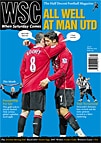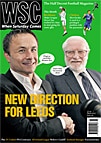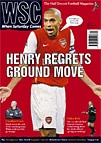 It’s time for a little optimistic thinking. Six WSC writers say how they would shake up the game this year, if the football genie appeared to them and granted them one wish
It’s time for a little optimistic thinking. Six WSC writers say how they would shake up the game this year, if the football genie appeared to them and granted them one wish
Downgrade Managers
Think of any Premiership manager: you’ll probably be able to hear his voice too. Sam Allardyce, for example: “We have a problem in this country playing to our traditional strengths.” Stuart Pearce: “Maybe I’m too honest, but that’s just me.” Rafa Benítez: “We play technical very good first half.” Even proven duds such as David O’Leary (“I’m not criticising those players in that dressing room”) and Graeme Souness (“Was it a penalty? You tell me”) have an easily recognisable presence in the white noise of football sound bites. It’s easy to forget that it hasn’t always been like this; and that one of the most consistently irritating side-effects of 15 years of Premiership overexposure has been the revolution in the public profile of managers.
The abnormally high profile of the current crop adds nothing to the spectacle of going to a match. Even their physical presence is a distraction, creating a compelling case for abolishing the “technical area”. What form of entertainment wouldn’t be ruined by the intrusion of an angrily gesturing Portuguese in the corner of your vision; or, on TV, the back of a fiery Ulsterman’s head repeatedly popping up at the bottom of your screen? Exhibitionist, embarrassing dad-style “coaching” from the sidelines should be classified as ungentlemanly conduct and deemed a bookable offence. Volleying the ball back, putting your arm around the fourth official’s shoulder, getting in on the goal celebrations: these are all very new and deeply undesirable things. Only the reintroduction of proper dug-out dugouts, populated by scowling men in horrible coats, can put an end to it all. Not to mention a three-day embargo on any form of managerial public comment before or after a game. They’d soon stop doing it.
There was a time when managers barely got a look in. Walter Winterbottom was England manager for the catastrophic 6‑3 defeat by Hungary at Wembley in 1953.There wasn’t a single reference to him in the hand-wringing press reports the following day. The national press singularly forgot to morph his head into a cauldron of goulash. So little-regarded was the job of “trainer” that Winterbottom’s name simply wasn’t mentioned. This state of affairs lasted until the appointment of his successor, Alf Ramsey, but even the celebrity managers that followed were really only on TV very occasionally compared to, say, Carlos Queiroz or Alan Pardew. Brian Clough’s celebrity gained its momentum from the impressions of Mike Yarwood and a million playground mimics.
In recent times, the need to manage “the media side of things” has led to appointments, and even whole careers, that would otherwise barely have got off the ground. Nobody can be good at everything; the general standard of nuts-and-bolts football management is bound to have suffered as a result. Can anyone even remember what Bob Paisley’s voice sounded like? As recently as the early 1980s, talking a lot on television just wasn’t in the job description. Paisley still seemed to do all right for himself. Imagine how much more interesting, and how much more widely respected, José Mourinho might be if he just kept on winning things without feeling the need to make a daily public pronouncement.
Barney Ronay
Read more…
 Without leaving his desk, Ian Plenderleith enjoys the finest and funniest views of football in Holland, Belgium, Luxembourg and beyond, in his latest look at sites that highlight photographs of the game
Without leaving his desk, Ian Plenderleith enjoys the finest and funniest views of football in Holland, Belgium, Luxembourg and beyond, in his latest look at sites that highlight photographs of the game
